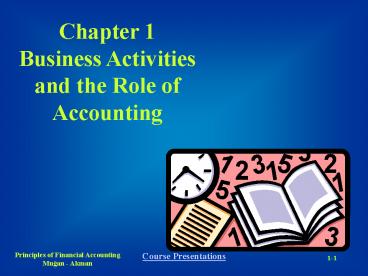Principles of Financial Accounting - PowerPoint PPT Presentation
1 / 19
Title:
Principles of Financial Accounting
Description:
Business Activities and the Role of Accounting. Principles of Financial Accounting ... 4.Determine the main business activities of a business entity ... – PowerPoint PPT presentation
Number of Views:263
Avg rating:3.0/5.0
Title: Principles of Financial Accounting
1
Chapter 1Business Activities and the Role of
Accounting
2
Learning Objectives
?
1.Determine the aim of the accounting
information 2.Identify the users of accounting
information 3.Understand the effects of
technological developments on the accounting
profession 4.Determine the main business
activities of a business entity
3
Learning Objectives
?
5.Identify the principal financial
statements 6.Understand the independent auditors
role in the accounting information 7.Identify
the organizations regulating the accounting
profession 8.Determine the career opportunities
in accounting
4
Aim of the Accounting Information
Accounting is an information system that
measures, processes and communicates financial
information of an economic entity to the decision
makers
5
.
Within the business system the accounting
information system can take the central position
because it gathers data from other subsystems and
also provides information and data to the other
subsystems
6
- The accountants role in the business
organization can be grouped as follows - To measure the financial performance and
position periodically and to prepare the
financial statements accordingly (financial
accounting) - To prepare reports to support management in the
decisions of costing and budgeting (managerial
accounting)
7
Users of Accounting Information
- Internal Users
- 1.Top management
- 2. Department managers
- External Users
- . Users with direct financial interest
- (creditors, investors)
- . Users with indirect financial interest
- (tax authorities regulatory agencies like CMB,
Central Bank Council of Banks Audit
Regulation)
8
Business Goals and Strategies
Business Goal is the target of a business entity
towards which all efforts are directed -
profitability (maximizing the profit earned from
operations) - liquidity (having adequate funds
to pay the obligations when they are due)
Business Strategies are the means to achieve the
set goals
9
Business Activities
Investing Activities
Operating Activities
Liquidity
Profitability
Financing Activities
10
Operating Activities
Involve the daily activities of the
entities Sales and marketing of goods sold and
services provided Production Purchasing
merchandise Managing human resources
11
Financing Activities
Are the activities that deal with obtaining funds
internally or externally Cash management Repaymen
t of debts Distribution of dividends
12
Investing Activities
Spending the funds obtained effectively and
efficiently Purchase and sale of
buildings Purchase and sale of investment
instruments
13
Principal Financial Statements
Income Statement Balance Sheet Cash Flow
Statement Statement of Changes in Equity
The preparation of these four statements is
required by the International Financial Reporting
Standards (IFRS)
14
Income Statement
15
(No Transcript)
16
Trends
- Currently the global trend is convergence of
accounting standards - The ultimate goal is to create a single set of
high quality standards International Financial
Reporting Standards (IFRS) - Several nations have already taken steps to
converge their regulatory framework with the
requirements of the IFRS
17
Case of Turkey
- The immediate effect of such developments on the
Turkish accounting systems preparation of a new
set of CMB rules that are essentially the same as
the International Financial Reporting Standards. - Inflation accounting and accounting for long-term
investments standards that are in line with IFRS
went into effect in year 2003. - The new set of other standards is also in line
with IFRS and will be effective in year 2005. - Hence, comparison of Turkish financial statements
with their international counterparts is
facilitated
18
Accounting Profession in Turkey
Acc. to law No 3968 enacted in 1989 regulating
the accounting profession in Turkey, the three
categories of accountants and their
responsibilities are
- Independent Accountant (IA)
- Practicing accountant who can keep the
accounting records of companies and develop
accounting systems within companies. - Independent Accountant and Financial Advisor
(IAFA) - Apart from the responsibilities of IAs, IAFAs
can conduct audit and perform consulting
services. - Sworn Financial Advisor (SFA)
- Sworn financial advisors cannot keep accounting
records of their clients. The have the
responsibility of certifying the financial
statements as defined by the law.
19
Career Opportunities in Accounting
Controller Internal Auditor Independent
Auditor Management Consultant Careers in Public
Sector































